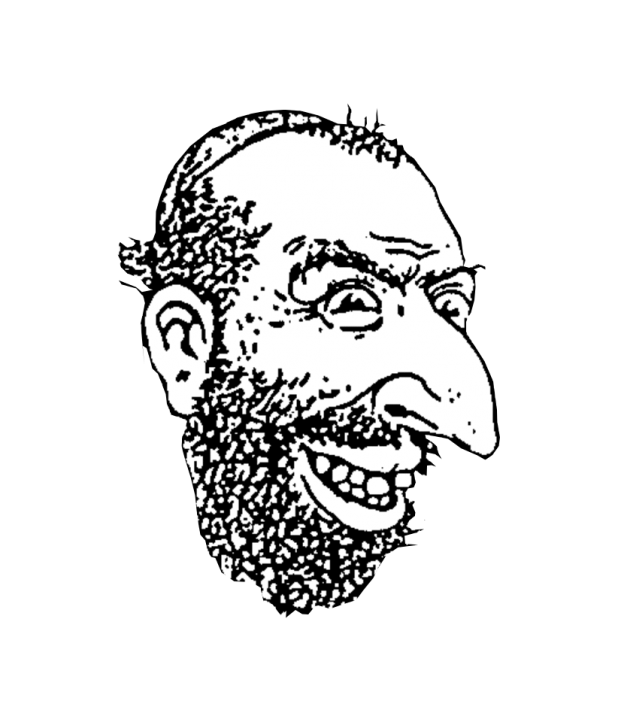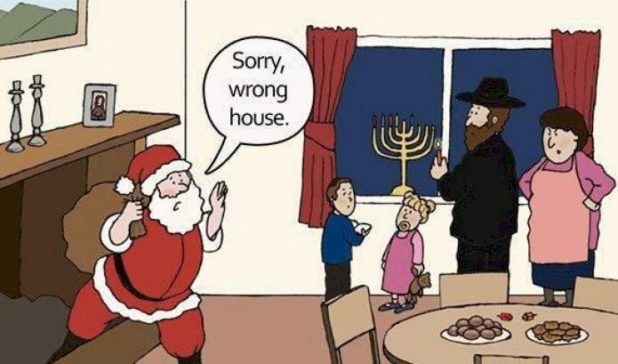Diversity Macht Frei
December 30, 2016
You have to marvel at the extraordinary qualities of the Talmudic mind. Its subtlety is such that it is able to simultaneously hold positions that, to the simple goy mind, would seem contradictory or hypocritical. Thus, it is possible for Jews to decry the hateful bigotry of goy who accuse them of waging a war on Christmas and then immediately acknowledge that they are indeed waging a war on Christmas and insist that such a war “must be fought”. Here, from another article in the Jewish Daily Forward, we begin with disgust at the crazy antisemitism of it all.
Moreover, we must not forgot that Donald Trump ran, in part, on a pro-Christmas platform. Indeed, he recently told a rally in Michigan that “We’re going to start saying ‘Merry Christmas’ again.” At the very least, this can be seen as a rejection of multiculturalism, and the implicit endorsement of a Christian nation. At worst, it’s anti-Semitism plain and simple.
As Adam Kirsch writes in Tablet, “The implied reasoning is that Americans stopped saying ‘Merry Christmas’ and started using ‘Happy Holidays’ because of the unwelcome arrival of people who did not celebrate the Christian holiday—people who forced Christian Americans to abandon a religious custom in order to cater, in politically correct fashion, to their alien sensitivities.”
“Theoretically,” he continues, it might be possible to think of Muslims or Hindus as the guilty party here. But historically, of course, it is the Jews who were the first major immigrant group to change the complexion of Christian America. For a long time, this change was minimized by the adoption of ‘Judeo-Christian’ as a new adjective for American religion. Jews, in this view, might not actually celebrate Christmas, but they could be comfortably grandfathered in as honorary members of the Christian tradition. But in recent years, this tolerance has been eroding as the notion of a ‘war on Christmas’ gains traction, to the point that even so benign a figure as Garrison Keillor could complain about the Jewish conspiracy to replace Christmas carols with non-denominational holiday songs, like ‘White Christmas.’”
But the same author then goes on to admit that Jews are indeed waging a war on Christmas and why, despite Trump’s victory, this war “must be pressed” to remake and repair American culture.
The fervent opposition to any attempt at multiculturalism in the winter holiday sphere indicates exactly why this is an issue that must be pressed. Is saying Happy Holidays instead of Merry Christmas as important as preventing the deportations of millions of immigrants? No. Is ensuring that menorahs and other non-Christian religious artifacts populate any space with a Christmas tree as pressing as opposing the creation of a national Muslim registry? Not at all. But within the zone of the culture wars, this is one of the preeminent issues, and the attacks on the Lancaster County family shows it can have truly grievous consequences.
The War on Christmas is really a War for Inclusivity, and it is essential as we look towards remaking and repairing American culture going forward from this divisive election. To abandon multiculturalism or identity politics because Middle America rejected them is to simply surrender after years of hard work. No, the work must continue and the war must be fought. Happy holidays.
Tracing the linked article back to the Tablet reveals some interesting stuff. The Jew there quotes some old stories to explain how Christmas was never really about Christ and was always just about having a good time. So the Jews aren’t to blame for that. Ah OK, thanks for setting the record straight there, Jew. He then admits Hanukkah is basically a fake holiday the Jews never really cared about but bigged up in the last 100 years or to rival Christmas.
Reading these classic Christmas tales helps to explain how American Jews could develop Hanukkah, previously a fairly minor winter holiday, into such a successful counterpart to Christmas. Religiously and ideologically, Hanukkah is just about the worst holiday possible for such a purpose—it is, after all, a story about Jews resisting assimilation by violence.
Yes indeed. What would be the contemporary goy equivalent of the events that inspired the Hannukah holiday? It would probably involve the rising up of the European peoples, the massacre of their rulers, followed by the expulsion and extermination of the ethnic aliens living in their lands. A few might be allowed to remain but these would be forcibly converted to Christianity; required to listen to Wagner instead of rap; and compelled to learn Mein Kampf off by heart. That, in essence, is what Hanukkah celebrates.
That European Christians are asked to accept an implicit equivalence between, as they see it, their Saviour being born into a world in which he would later give his life to redeem humanity, and, on the other, a celebration of race war and genocide directed against their own race, is itself a moral perversion and a defilement of Christianity.
The Tablet Jew then goes on to describe another Jewish tradition: Nittel Nacht.
Compare this to the way Jews used to “observe” Christmas Eve in Eastern Europe, on what they referred to as Nittel Nacht: by holding vigil all night and refraining from Torah study, both for theological reasons and to avoid incurring the wrath of celebrating Christians. (The custom of playing dreidel may originate in the games Jews played to pass the time while locked in their houses on Nittel Nacht.) The fact that most American Jews today have never heard of this tradition is a sign of how completely our relationship to Christians and Christianity has changed for the better. That makes Christmas a holiday worth celebrating for Jews, and other non-Christians, as well.
His phrase “to avoid incurring the wrath of celebrating Christians” suggests Jews spent the night huddled in fear lest a Christian mob arrive to carry out a pogrom. I had never heard of this before and decided to look into it. Like most stories of the persecution of the Jews, I imagined this one would turn out to be a fable. And so it proved. But also very revealing.
The Talmud, with its share of rabbinic repudiations against Jesus, was never a big fan of Christmas. Call it the Grinch. Indeed, the rabbis looked at it as a day of mourning—perhaps due to the suffering that Jews encountered in Jesus’ name throughout history. And Christmas Eve—named “Nittel Nacht” by Jewish scholars in the 17th century—took on a life of its own. Some Jewish mystics were under the impression that many apostates were conceived on Christmas Eve (which is one reason the rabbis forbade sex on Dec. 24; more on that later).
In Europe, the Jewish community was victim of more acts of violence on this night. All in all, it didn’t end up being a festive evening for Jews. And so the rabbis decreed that the public study hall be closed and that no Torah learning take place on this night. I guess it’s our version of “Silent Night”—literally. The edict came about partially because of pogroms, but the leaders were also concerned about the popularly held belief in Judaism that studying the Torah brings spiritual benefit to the world at large. Many didn’t want to make this positive contribution on what they considered a “pagan” night.
Source (You should read the linked article in full)
So, you see, the tradition of Jews desanctifying and degrading Christianity goes back centuries. And some Jews still practice this Nittel Nacht ritual of defilement today.
See also an earlier article on this subject (link).

